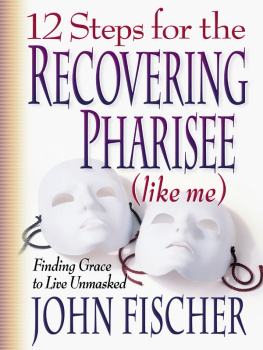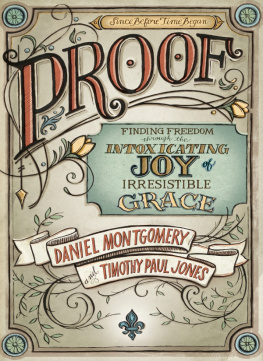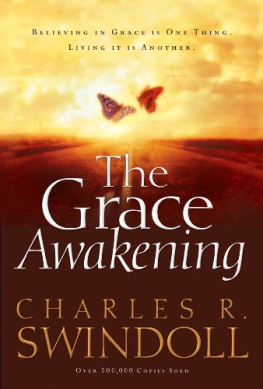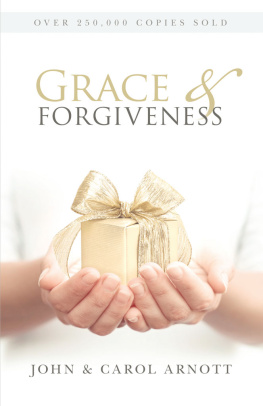John Fischer - 12 Steps for the Recovering Pharisee (like me): Finding Grace to Live Unmasked
Here you can read online John Fischer - 12 Steps for the Recovering Pharisee (like me): Finding Grace to Live Unmasked full text of the book (entire story) in english for free. Download pdf and epub, get meaning, cover and reviews about this ebook. year: 2000, publisher: Baker Publishing Group, genre: Religion. Description of the work, (preface) as well as reviews are available. Best literature library LitArk.com created for fans of good reading and offers a wide selection of genres:
Romance novel
Science fiction
Adventure
Detective
Science
History
Home and family
Prose
Art
Politics
Computer
Non-fiction
Religion
Business
Children
Humor
Choose a favorite category and find really read worthwhile books. Enjoy immersion in the world of imagination, feel the emotions of the characters or learn something new for yourself, make an fascinating discovery.
- Book:12 Steps for the Recovering Pharisee (like me): Finding Grace to Live Unmasked
- Author:
- Publisher:Baker Publishing Group
- Genre:
- Year:2000
- Rating:3 / 5
- Favourites:Add to favourites
- Your mark:
- 60
- 1
- 2
- 3
- 4
- 5
12 Steps for the Recovering Pharisee (like me): Finding Grace to Live Unmasked: summary, description and annotation
We offer to read an annotation, description, summary or preface (depends on what the author of the book "12 Steps for the Recovering Pharisee (like me): Finding Grace to Live Unmasked" wrote himself). If you haven't found the necessary information about the book — write in the comments, we will try to find it.
John Fischer: author's other books
Who wrote 12 Steps for the Recovering Pharisee (like me): Finding Grace to Live Unmasked? Find out the surname, the name of the author of the book and a list of all author's works by series.
12 Steps for the Recovering Pharisee (like me): Finding Grace to Live Unmasked — read online for free the complete book (whole text) full work
Below is the text of the book, divided by pages. System saving the place of the last page read, allows you to conveniently read the book "12 Steps for the Recovering Pharisee (like me): Finding Grace to Live Unmasked" online for free, without having to search again every time where you left off. Put a bookmark, and you can go to the page where you finished reading at any time.
Font size:
Interval:
Bookmark:
Books by John Fischer
FROM BETHANY HOUSE PUBLISHERS
On a Hill Too Far Away
12 Steps for the Recovering Pharisee (like me)
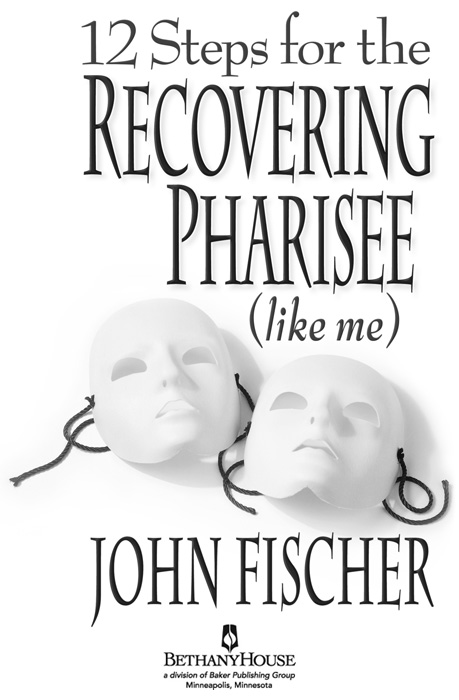
12 Steps for the Recovering Pharisee
Copyright 2000
John Fischer
Cover by Terry Dugan
Unless otherwise identified, Scripture quotations are from the HOLY BIBLE, NEW INTERNATIONAL VERSION. Copyright 1973, 1978, 1984 by International Bible Society. Used by permission of Zondervan Publishing House. All rights reserved. The NIV and New International Version trademarks are registered in the United States Patent and Trademark Office by International Bible Society. Use of either trademark requires the permission of International Bible Society.
All rights reserved. No part of this publication may be reproduced, stored in a retrieval system, or transmitted in any form or by any meanselectronic, mechanical, photocopying, recording, or otherwisewithout the prior written permission of the publisher. The only exception is brief quotations in printed reviews.
Published by Bethany House Publishers
11400 Hampshire Avenue South
Bloomington, Minnesota 55438
www.bethanyhouse.com
Bethany House Publishers is a division of
Baker Publishing Group, Grand Rapids, Michigan.
Ebook edition created 2011
ISBN 978-1-5855-8834-3
Library of Congress Cataloging-in-Publication Data is on file at the Library of Congress, Washington, DC.
My courage to speak in this book has been bolstered by certain Christian writers and speakers who have chosen to tell the truth about themselves and their humanity, giving little regard to their reputations. These people make no secret of their sins and struggles, leaving us with a true picture of God's grace and no confusion as to who they, and consequently we, are to follow. Though there are others, the ones who have had a most profound effect on my life of faith would be Frederick Buechner, C. S. Lewis, Brennan Manning, and my pastor, Chuck Smith Jr. I would like to acknowledge them for their courage. I would also like to thank Christopher Soderstrom for his editing and for the excellent study questions at the conclusion of this book.
JOHN FISCHER, pioneering musician, songwriter, and popular speaker, is also the award-winning author of many books. For years his insightful columns have been a favorite monthly feature in Contemporary Christian Music Magazine. A graduate of Wheaton College, John and his family now live in California.
Contents
A S I HAVE GROWN TO UNDERSTAND THE GOSPEL AND LEARN more of God's grace, I have also become conscious of a corresponding struggle with pride and self-righteousness. Like anyone, I want to be well thought of. I am often conscious, as I am even now, of picking my words carefully, like walking through a minefield of impressions, so as to appear honest while stopping short of the naked truth that might implicate me more than I am willing. It is a problem that the Pharisees of Jesus' day sought to overcome by concealing themselves behind a whitewashed religious veneer.
So when a gentleman came up to me at a summer music festival at which I was teaching and commented on how he had found my writings to be, for him, like a twelve-step plan for recovering Pharisees, I realized that I had been working on rooting out this problem for quite a while, though until now it had never been the focus of my work. I decided it was time to make it such. His fingering of this correlation struck a chord in me, as did the use of the recovery model as a creative approach to this chronic spiritual disease.
My use of the recovery model in this book admittedly is somewhat tongue-in-cheek. I am not expecting Pharisee recovery groups to spring up all over the country as a result of my discussions here (though it might not be such a bad idea), nor am I expecting people to see these steps as some sort of methodology through which they can accomplish the permanent eradication of pride and self-projected superiority. I am more interested in borrowing the recovery model as a way of unmasking, and potentially freeing us from, the intoxication of spiritual pride and prejudice that continually lures believers away from the grace, gratitude, and life of astonishment that the Spirit of God desires for us.
It is my firm belief that the prideful attitude of the Pharisees and the practice of measuring out righteousness are problems that affect not only Christians but everyone at some point. They are built into human nature. They even accompany other religions and cults. Pharisaism always seems to show up whenever righteousness is pursued in any form, at any level. Acceptance on the basis of performance was how most of us began our lives, and it's not easy to shake. In biblical history this is called the Old Covenant.
The Old Covenant requires a standard of performance and a reason to be obedient to it. But the standard, in its truest form, is impossible to pull off consistently. It could be argued that this is the whole point of God's dealings with humanity through the covenants. The Old Covenant is there to break us, to show us that we cannot live according to its preceptsthat sin and selfishness dwell in us to a significant degree so as to rule out the possibility of following even the clear call of Jesus to love God, self, and others. This inability to follow the standard, along with its accompanying humility, qualifies us for a Saviorsomeone who will fulfill the law on our behalf and grant us righteousness as a free gift. This is God's grace as given to us in the New Covenant through the death and resurrection of our Lord and Savior Jesus Christ.
The Pharisees enter the picture as the ones who figure out a way to make the Old Covenant work for them, thus making the new one unnecessary. As official interpreters of the laws of God, they adapt the standard through their own interpretation until the law (actually, their version of it) becomes something that is not impossible to perform but indeed quite possible, though difficult and meticulous at times. The standard is set so that attaining it is difficult enough to weed out the undesirables but not so difficult as to become overly burdensomeand that's the key. Armed with this new standard, Pharisees can then qualify themselves for righteousness and judge those who, according to their measurement, fall short. Once this course is entered upon, it can branch into myriad avenues of arrogance, judgment, and false humility.
What makes pharisaical sin so dangerous is that it disguises itself as a form of enlightenment. This is what Jesus meant when he said, If then the light within you is darkness, how great is that darkness! (Matthew 6:23).
The darkness is great because one is deluded into thinking it is light. You think you are seeing better than anyone else, when, in fact, you can't see at all. This means the idea that you can't see is farthest from you. A blind person knows he is blind. A Pharisee thinks he can see, and this is why the light within him is actually darkness. Jesus called the Pharisees blind guides.
So it is necessary in this darkness that we call light to identify our error and get free from our entrapmentexactly the job of all recovery groups. It could even be argued that our churches ought to be more like this. The church should be the most honest place on eartha place where it is possible to say among friends: Hi, I'm John, and I'm a Pharisee.
Hi, John, comes the echo, and we revel in the realization that this is the meeting place of accountability for equals. These are the Simons who want to come down off their pedestals and join the company of saved sinners at the feet of Jesus, who, like the prostitute anointing his feet with perfume and tears, can't seem to get enough of this grace and forgiveness. This is the gospel for those courageous enough to tear off their masks of adequacy and self-righteousness and get on with a life of gratitude and love for others. This is the Pharisee recovery group of which I speak, and these are the steps that will lead us out. I know, for I am an expert in the downturned look, the haughty eye, the wagging headand I've had enough of it.
Next pageFont size:
Interval:
Bookmark:
Similar books «12 Steps for the Recovering Pharisee (like me): Finding Grace to Live Unmasked»
Look at similar books to 12 Steps for the Recovering Pharisee (like me): Finding Grace to Live Unmasked. We have selected literature similar in name and meaning in the hope of providing readers with more options to find new, interesting, not yet read works.
Discussion, reviews of the book 12 Steps for the Recovering Pharisee (like me): Finding Grace to Live Unmasked and just readers' own opinions. Leave your comments, write what you think about the work, its meaning or the main characters. Specify what exactly you liked and what you didn't like, and why you think so.

